Moringa Benefits Unveiled: The Ultimate Guide to the Health Wonders of the 'Miracle Tree'
Table of Contents
Introduction
Moringa Oleifera, often dubbed the “miracle tree” or “drumstick tree,” holds a revered spot in the superfood realm. Its rich nutritional content and historical significance across Asia and Africa make it a standout. The Moringa benefits are vast and varied, from its therapeutic properties recognized in traditional medicine to its modern-day acclaim. This guide aims to highlight the Moringa benefits that have been celebrated for centuries, providing insights into its daily consumption and the transformative impact on health. Dive in to uncover the myriad Moringa benefits and understand why it remains a cornerstone in holistic wellness.

Historical Significance of Moringa
Moringa Oleifera’s legacy is deep-seated and vast. Tracing back thousands of years, this “miracle tree” or “drumstick tree” has been a focal point in various ancient cultures and medicinal systems. Ancient scriptures, manuscripts, and oral traditions frequently mention the myriad Moringa benefits. In the Ayurvedic system of India, it was revered as a cure for over 300 ailments, showcasing its therapeutic versatility.
Meanwhile, ancient Egyptian cultures prized moringa oil, using it as a protective shield for the skin against the relentless desert sun. From its nutritional prowess to its medicinal significance, Moringa’s benefits have been celebrated and passed down through generations, making it a global symbol of holistic health and wellness.
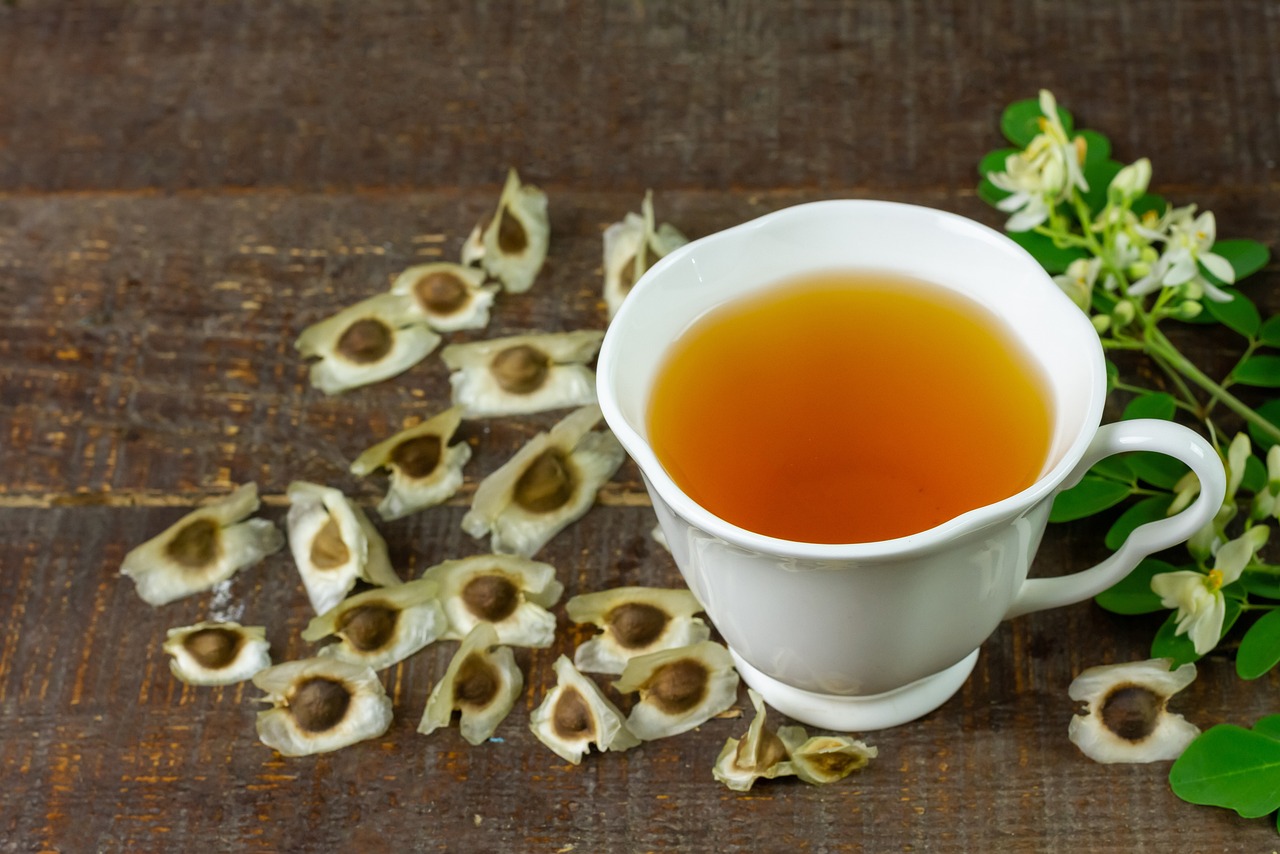
Unpacking the Nutritional Profile of Moringa oleifera
Moringa oleifera, often dubbed the “miracle tree,” is not just a name; it’s a testament to its nutrient-dense profile. Every part of the moringa tree, from its leaves to its seeds, is packed with beneficial nutrients. However, the leaves are especially renowned for their impressive array of vitamins, minerals, and other essential compounds.
Vitamins and Minerals
Vitamin A: Moringa leaves are rich in beta-carotene, a precursor of vitamin A. This vitamin is crucial for maintaining healthy vision, skin, and immune function. In fact, moringa provides four times more vitamin A than carrots.
Vitamin C: Known for its immune-boosting properties, vitamin C is abundant in moringa. Surpassing even oranges, moringa offers seven times more vitamin C, making it an excellent source for bolstering immunity and promoting skin health.
Vitamin E: A potent antioxidant, vitamin E in moringa aids in protecting cells from oxidative damage. It also plays a role in immune function and skin health.
Calcium: Essential for bone health, moringa offers more calcium than milk, making it a valuable source, especially for those who are lactose intolerant.
Potassium: Moringa’s potassium content surpasses that of bananas. This mineral is vital for maintaining proper heart and muscle function.
Iron: Essential for the production of red blood cells, moringa provides a substantial amount of iron, even more than spinach. It’s a boon for vegetarians and vegans looking for plant-based iron sources.
Amino Acids
Complete Protein: Moringa leaves are a rarity in the plant world because they provide all nine essential amino acids, making them a complete protein source. These amino acids are the building blocks of proteins and are vital for muscle repair, energy production, and overall growth.
Lysine, Leucine, and More: Among the amino acids present in moringa are lysine, which is crucial for growth and bone health, and leucine, which aids in protein synthesis.
Antioxidants
Quercetin: This powerful antioxidant helps lower blood pressure and has anti-inflammatory effects.
Chlorogenic Acid: Found in high amounts in moringa, this compound helps moderate blood sugar levels post meals.
Beta-Carotene: A precursor to vitamin A, it’s a potent antioxidant that combats free radicals, reducing oxidative stress.
Zeatin: Unique to moringa, zeatin has powerful anti-aging properties. It aids in cellular growth and delays the aging process of cells.
In essence, moringa’s nutritional profile is a testament to its title as a “superfood.” Whether you’re looking to boost your vitamin intake, get a plant-based protein source, or harness the benefits of its antioxidants, moringa has it all. Integrating it into one’s diet can pave the way for a myriad of health benefits.
Moringa's Multifaceted Health Benefits
1. Blood Sugar Regulation:
Moringa’s role in blood sugar regulation is backed by numerous studies. The chlorogenic acid present in moringa leaves acts as a modulator for glucose intake in cells, helping to stabilize blood sugar levels. For individuals with diabetes or those with prediabetic symptoms, consistent consumption of moringa can be a natural way to manage blood sugar fluctuations. Additionally, the presence of compounds like quercetin further enhances its anti-diabetic properties.
2. Heart Health and Lower Blood Pressure:
Moringa’s cardiovascular benefits are multifaceted. Its antioxidant properties help combat oxidative stress, a significant contributor to heart disease. The potassium in moringa acts as a vasodilator, relaxing the blood vessels and reducing blood pressure. The isothiocyanates, alongside other compounds, have been shown to assist in preventing the thickening of arterial walls, reducing the risk of hypertension and heart disease.
3. Brain Health and Cognitive Support:
Moringa’s rich content of antioxidants like quercetin and vitamin E helps combat oxidative stress in the brain. These compounds, alongside its anti-inflammatory properties, offer protection against neurodegenerative diseases like Alzheimer’s. Additionally, moringa supports mood regulation, memory, and neurotransmitter functions, ensuring optimal cognitive health.
4. Anti-inflammatory and Immune Boosting Properties:
Moringa contains several bioactive compounds, including isothiocyanates, that exhibit strong anti-inflammatory actions. Chronic inflammation is linked to many severe health conditions, and moringa’s ability to combat this is invaluable. Its immunomodulatory properties enhance the body’s immune response, making it more resilient against infections.
5. Digestive Health and Detoxification:
Moringa aids in the efficient functioning of the digestive system. Its anti-inflammatory properties can help alleviate stomach ulcers and other digestive disorders. The presence of niaziminin compounds in moringa offers protective effects against liver damage, ensuring its optimal function in detoxifying the body.
6. Skin and Hair Benefits:
Moringa’s skin benefits are attributed to its hydration, antimicrobial, and antioxidant properties. Vitamins A and E in moringa rejuvenate the skin, reducing wrinkles and age spots. For hair, the zinc in moringa promotes keratin production, leading to stronger, shinier hair. Its antifungal properties can combat common scalp issues like dandruff.
7. Weight Management:
Moringa’s role in weight management is twofold. Its fiber content promotes feelings of fullness, reducing calorie intake. Simultaneously, its ability to regulate blood sugar levels can prevent sudden spikes and crashes, which often lead to unhealthy snacking.
8. Bone Health:
Moringa’s impressive calcium content, combined with vitamin K, magnesium, and phosphorus, ensures robust bone health. These nutrients aid in bone mineralization and reduce the risk of bone fractures.
9. Antimicrobial and Wound Healing Properties:
Moringa’s antimicrobial properties have been documented against a range of pathogens, including E. coli and Salmonella. Its role in wound healing can be attributed to its anti-inflammatory and antibacterial properties, which accelerate the healing process and reduce the risk of infections.
Moringa’s extensive health benefits make it a valuable addition to any diet. However, as with any supplement or dietary change, it’s essential to consult with a healthcare professional to ensure it’s suitable for individual health needs.
The Science Behind Moringa's Health Benefits
The therapeutic properties of Moringa oleifera have been a subject of interest in the scientific community. Modern research, through rigorous studies and trials, has begun to validate many of the traditional claims surrounding this “miracle tree.”
Blood Sugar Control
Mechanism: Moringa Oleifera leaf extracts have demonstrated a significant effect in reducing blood sugar levels. Compounds like chlorogenic acid present in moringa play a role in slowing down the absorption of sugar in the cells. Additionally, isothiocyanates, known for their anti-diabetic effects, are abundant in moringa.
Clinical Evidence: In various clinical trials, diabetic patients who consumed moringa showed a notable reduction in their blood glucose levels, highlighting its potential as a natural remedy for diabetes management.
Cholesterol Management
Mechanism: Moringa is rich in beta-sitosterol, a phytosterol that has cholesterol-lowering properties. It works by inhibiting the absorption of cholesterol in the intestines.
Clinical Evidence: Regular consumption of moringa has been linked to reduced LDL cholesterol levels in several studies. By lowering “bad cholesterol,” moringa not only promotes heart health but also mitigates the risk factors associated with cardiovascular diseases.
Anti-Cancer Properties
Mechanism: Moringa contains compounds like niazimicin and benzyl isothiocyanate that have shown anti-cancer effects. These compounds inhibit the growth and proliferation of cancer cells and induce apoptosis (programmed cell death).
Clinical Evidence: Preliminary in-vitro studies have demonstrated that moringa extracts can inhibit the growth of various cancer cells, including pancreatic, colon, and breast cancer cells. While these findings are promising, more extensive clinical trials are needed to establish moringa as a potential anti-cancer agent.
Brain Health
Mechanism: Moringa is a powerhouse of antioxidants like quercetin, chlorogenic acid, and beta-carotene. These compounds combat oxidative stress, a major contributor to neurodegenerative diseases. Additionally, moringa promotes brain-derived neurotrophic factor (BDNF), a protein that supports brain function and combats cognitive decline.
Clinical Evidence: Animal studies have shown that moringa supplementation can reverse the effects of Alzheimer’s disease in rats. Its neuroprotective effects are attributed to its rich antioxidant content, which combats oxidative stress and inflammation in the brain.
In conclusion, while traditional medicine has long recognized the benefits of Moringa oleifera, modern science is now catching up. The convergence of traditional knowledge with scientific validation offers exciting possibilities for the therapeutic application of this remarkable plant.
Moringa in Traditional Medicine Systems
Moringa oleifera, often referred to as the “drumstick tree” or “miracle tree,” has been revered for centuries in various traditional medicine systems for its therapeutic properties. Its leaves, seeds, bark, and roots have all been utilized to address a wide range of health concerns.
Ayurveda
In the ancient Indian system of Ayurveda, Moringa, known as “Shigru,” holds a significant place.
Balancing the Doshas: Moringa is believed to regulate the three primary life energies or doshas – Vata (air and space), Pitta (fire and water), and Kapha (water and earth). An imbalance in these doshas is thought to lead to illness.
Arthritis: The anti-inflammatory properties of Moringa have been employed to reduce swelling and pain associated with arthritis.
Digestive Disorders: Moringa has been used to treat a variety of digestive ailments, including constipation, gastritis, and ulcerative colitis. Its high fiber content aids in digestion and promotes a healthy gut.
Respiratory Health: Moringa’s anti-inflammatory and antihistaminic properties have made it a natural remedy for asthma and other respiratory issues.
African Traditional Medicine
Moringa’s benefits are not limited to the Indian subcontinent. In various parts of Africa, this tree has been an integral part of traditional healing practices.
Stomach Disorders: Moringa leaves have been used as a remedy for stomach upsets, ulcers, and other gastrointestinal problems.
Skin Diseases: Due to its antibacterial and anti-inflammatory properties, Moringa has been applied topically to treat a range of skin diseases, including fungal infections and acne.
Natural Antibiotic: Moringa seeds have been used as a natural antibiotic to combat bacterial infections.
Chinese Medicine
The ancient Chinese medicinal system also recognized the benefits of Moringa.
Detoxification: Moringa seeds, known for their purifying properties, have been employed to detoxify the body and rid it of harmful toxins.
Digestive Health: Similar to Ayurveda, Chinese medicine has used Moringa to treat digestive disorders, emphasizing its role in promoting gut health and regular bowel movements.
Antioxidant Properties: Moringa’s rich antioxidant content has been harnessed to combat oxidative stress, which is believed to be at the root of many chronic diseases in Chinese medicine.
By understanding the role of Moringa in these traditional medicine systems, one can truly appreciate its versatility and the wide range of health benefits it offers. Integrating this knowledge with modern scientific research can pave the way for innovative therapeutic applications of this remarkable plant.
Different Forms and Uses of Moringa
Moringa’s versatility is evident in its various forms, each offering unique benefits:
Moringa Leaf Powder
Often hailed as a superfood powerhouse, moringa leaf powder is perhaps the most sought-after form of this remarkable plant. Derived from the dried and ground leaves of the moringa tree, this vibrant green powder retains a majority of the plant’s nutritional value. Its versatility in culinary applications is commendable. Whether you’re sprinkling it atop fresh salads for a nutrient boost, blending it into your morning smoothies for an energizing kick, or incorporating it into your dishes as a flavorful seasoning, moringa leaf powder seamlessly fits into various recipes.
Beyond its culinary uses, its concentrated form ensures that with regular consumption, you’re not just enjoying its delightful taste but also harnessing the full spectrum of its health benefits, from antioxidants to essential amino acids.
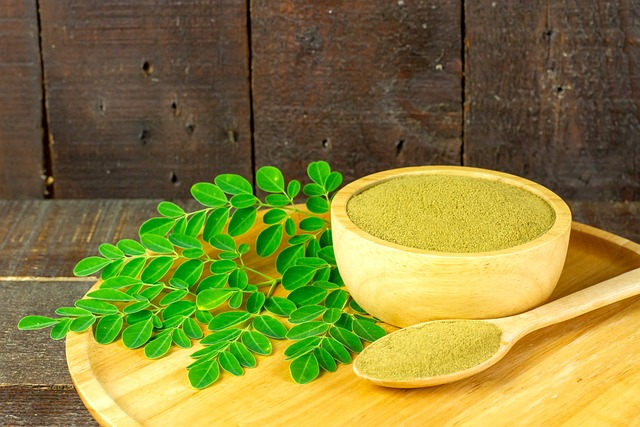
Moringa Tea
Steeped in tradition and bursting with health benefits, moringa tea is a delightful infusion made from the dried leaves of the moringa tree. With its subtle, earthy flavor, this tea offers a unique and refreshing alternative to your regular morning brew. But it’s not just about taste; every sip of moringa tea brings with it a wealth of nutritional benefits.
As the leaves are dried naturally, they retain most of their vital nutrients, ensuring that you get a dose of vitamins, minerals, and antioxidants with each cup. This makes moringa tea not just a beverage, but a nutritional powerhouse, seamlessly blending the comforting qualities of tea with the myriad health advantages of moringa. Whether you’re looking to kickstart your day, unwind in the evening, or simply seeking a healthful pick-me-up, moringa tea is the perfect choice.
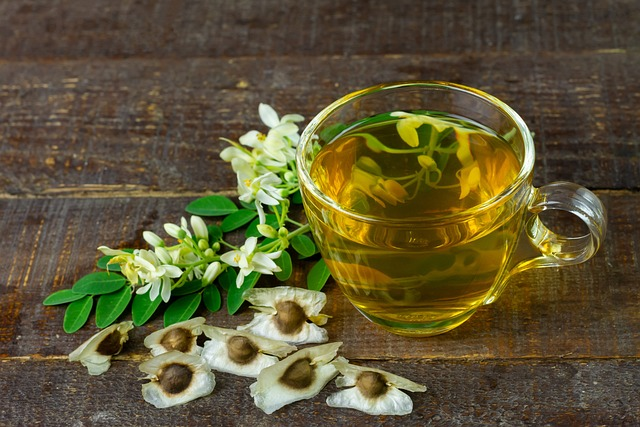
Our Recommendations:
Please see our Best Moringa Tea page for full reviews of our top 5 Moringa Teas and where to buy them
Moringa Oil
Derived from the seeds of the moringa tree, this golden oil is a treasure in both beauty and culinary worlds. In skincare and haircare, its rich fatty acids and antioxidants make it a sought-after moisturizer, rejuvenating skin and fortifying hair. Beyond beauty, moringa oil, with its mild, nutty flavor, is valued in cooking, especially in traditional dishes from Africa and Asia. Its high smoke point makes it ideal for frying, while its nutritional benefits elevate it beyond just a cooking medium, adding both taste and health to meals.
Additionally, the sustainability of moringa oil production, coupled with its myriad uses, makes it a favored choice among eco-conscious consumers and chefs alike, bridging the gap between health, beauty, and environmental responsibility.
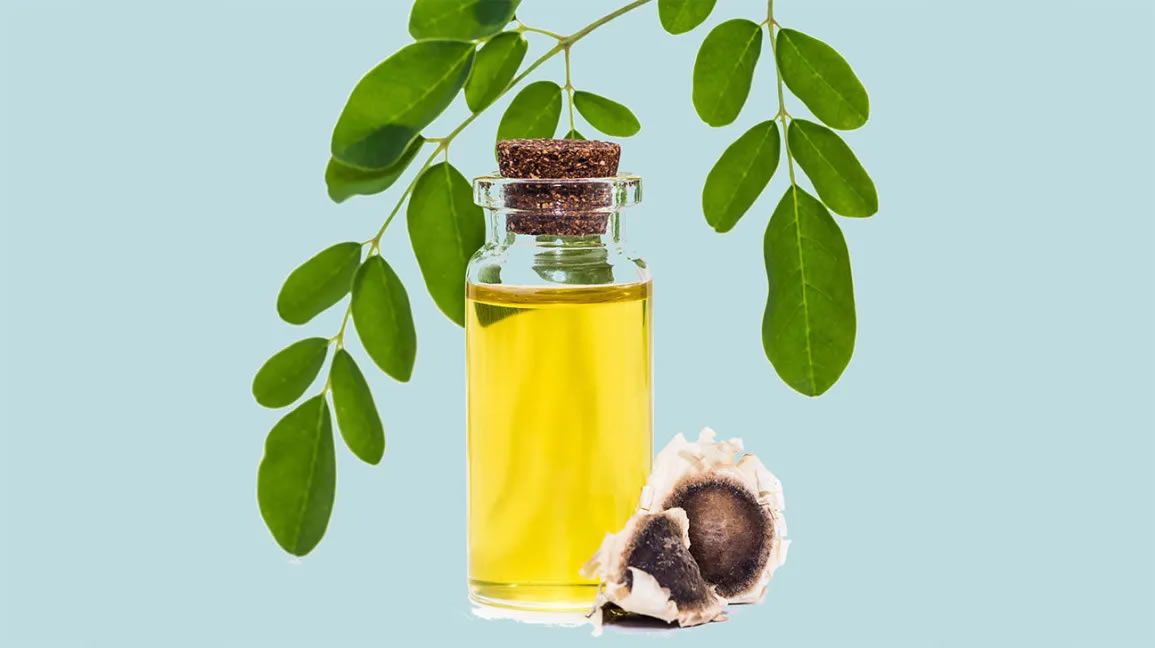
Moringa Capsules
In today’s fast-paced world, convenience is key, and for those seeking the myriad benefits of moringa without the fuss of preparation, moringa capsules are the perfect solution. These dietary supplements encapsulate the nutritional essence of the moringa tree, providing a potent and concentrated dose of its vitamins, minerals, and antioxidants. Ideal for individuals on the go, these capsules ensure that you don’t miss out on the health-boosting properties of moringa, even with a busy schedule. Whether you’re traveling, at work, or simply prefer a hassle-free intake, moringa capsules offer a streamlined way to incorporate this superfood into your daily regimen, ensuring you harness its full potential for optimal well-being.
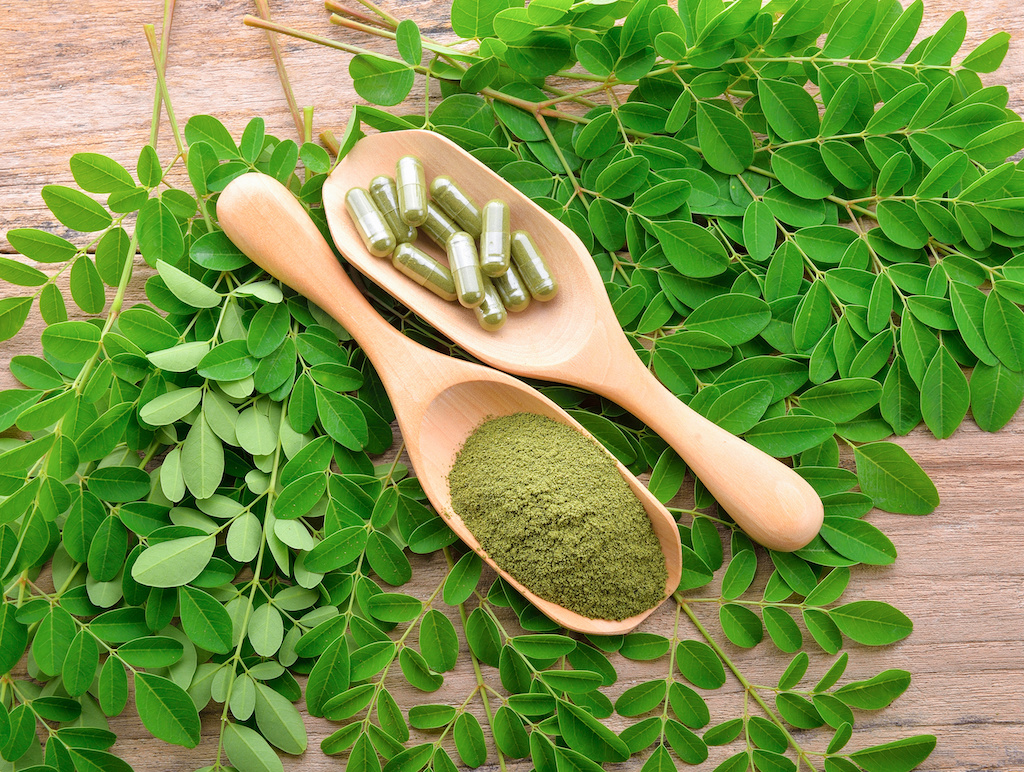
Incorporating Moringa Oleifera into Your Daily Diet
Moringa, with its rich nutritional profile, can be a valuable addition to various meals and beverages. Here are some creative ways to make the most of this superfood:
Smoothies:
Boosted Green Smoothie: Blend moringa leaf powder with spinach, kale, green apple, banana, and almond milk for a nutrient-packed green smoothie.
Tropical Moringa Smoothie: Combine moringa powder with mango, pineapple, coconut milk, and a dash of honey for a tropical treat.
Teas:
Moringa Herbal Infusion: Steep dried moringa leaves with ginger and lemon slices for a zesty herbal tea.
Moringa Chai: Add moringa powder to your regular chai tea for an added health kick. The spices in chai, like cardamom and cinnamon, complement moringa’s earthy flavor.
Salads:
Moringa Dressing: Whisk together moringa powder, olive oil, lemon juice, honey, salt, and pepper for a unique salad dressing.
Protein-Packed Salad: Toss chickpeas, quinoa, cherry tomatoes, cucumber, and feta cheese with a sprinkle of moringa powder for a protein-rich meal.
Cooking:
Moringa Soup: Add moringa leaves to lentil or chicken soup. The leaves will soften as they cook, blending seamlessly into the broth.
Moringa Stir-fry: Sauté moringa leaves with vegetables like bell peppers, broccoli, and snap peas. Add tofu or chicken, and season with soy sauce and garlic for a quick stir-fry.
Moringa Pasta: Blend moringa powder with basil, pine nuts, garlic, parmesan, and olive oil to create a moringa pesto. Toss with your favorite pasta for a nutritious meal.
Baking:
Moringa Muffins: Incorporate moringa powder into your muffin or bread recipes. It pairs well with banana, zucchini, or carrot bases.
Moringa Pancakes: Add a spoonful of moringa powder to your pancake batter for a healthful twist to your breakfast.
Snacks:
Moringa Energy Balls: Mix moringa powder with dates, nuts, seeds, and honey. Roll into balls and refrigerate for a quick energy snack.
Moringa Yogurt: Stir moringa powder into your yogurt or acai bowl. Top with fresh fruits and granola.
Remember, when incorporating moringa into your diet, start with small amounts and gradually increase as you become accustomed to its flavor. As with any supplement, it’s essential to consult with a healthcare professional before making significant dietary changes.
Addressing Common Questions About Moringa
What does moringa do for your body?
Moringa Oleifera, often referred to as the “miracle tree,” is a nutritional powerhouse. It provides a rich source of essential nutrients, including vitamins, minerals, and amino acids. Regular consumption of moringa leaf powder or Moringa Oleifera leaf extracts can offer numerous health benefits, such as stabilizing blood sugar levels, supporting cardiovascular health, enhancing brain function, and boosting the immune system. Its anti-inflammatory properties also help combat chronic diseases and support overall well-being.
What essential nutrients can be found in moringa, and why are they important for our health?
Moringa is often referred to as a “superfood” due to its impressive array of essential nutrients. These nutrients play a pivotal role in maintaining overall health and supporting various bodily functions:
Vitamins: Moringa is a rich source of vitamins A, C, and E. Vitamin A is crucial for vision, immune function, and skin health. Vitamin C aids in collagen production, wound healing, and immune support. Vitamin E acts as a powerful antioxidant, protecting cells from oxidative damage.
Minerals: Moringa contains essential minerals like calcium, potassium, iron, and magnesium. Calcium is vital for bone health, potassium regulates blood pressure and fluid balance, iron is essential for oxygen transport in the blood, and magnesium supports muscle and nerve function.
Amino Acids: Moringa leaves provide 18 out of the 20 essential amino acids required by the human body, including all nine essential amino acids. Amino acids are the building blocks of proteins, which are necessary for growth, repair, and maintaining muscle mass.
Antioxidants: Compounds like quercetin, chlorogenic acid, and beta-carotene in moringa combat free radicals in the body. Antioxidants reduce oxidative stress, preventing cellular damage and reducing the risk of chronic diseases.
Fiber: Moringa leaves are a good source of dietary fiber, which aids in digestion, promotes a feeling of fullness, and supports healthy cholesterol levels.
Incorporating moringa into one’s diet can help ensure that the body receives these essential nutrients, promoting overall health and well-being.
What happens if you take moringa every day?
Taking moringa every day can lead to a range of health benefits. The chlorogenic acid in moringa leaves helps regulate blood sugar, making it beneficial for diabetics. Its rich antioxidant content can enhance skin health, reduce signs of aging, and combat oxidative stress. Moreover, the essential amino acids in moringa support muscle growth, repair, and overall body function. However, as with any dietary supplement, it’s essential to consume moringa in recommended doses to avoid potential side effects.
What happens when you start taking moringa?
Taking moringa every day can lead to a range of health benefits. The chlorogenic acid in moringa leaves helps regulate blood sugar, making it beneficial for diabetics. Its rich antioxidant content can enhance skin health, reduce signs of aging, and combat oxidative stress. Moreover, the essential amino acids in moringa support muscle growth, repair, and overall body function. However, as with any dietary supplement, it’s essential to consume moringa in recommended doses to avoid potential side effects.
What are the side effects of moringa?
While moringa is generally safe for consumption, excessive intake can lead to potential side effects. Some individuals might experience nausea, heartburn, or diarrhea. It’s crucial to consult with a healthcare professional before starting or increasing the dosage, especially if taking other medications or if pregnant.
Is it good to take moringa every day?
Yes, daily consumption of moringa, whether in powder, capsule form, or as moringa tea, can offer a plethora of health benefits. However, it’s essential to stick to recommended dosages and ensure the product’s purity and quality.
How long does it take for moringa to start working?
The effects of moringa can vary from person to person. Some individuals notice improvements in energy levels and digestion within a week, while others might take a few weeks to observe noticeable benefits, especially in areas like blood sugar regulation and skin health.
Does moringa cleanse the body?
Yes, moringa has detoxifying properties. Its fiber content aids in promoting healthy digestion and regular bowel movements, ensuring the efficient elimination of toxins. Additionally, certain compounds in moringa support liver function, further enhancing the body’s natural detoxification processes.
What do moringa oleifera leaves do to the body?
Moringa leaves are a nutritional goldmine. They provide essential vitamins, minerals, and amino acids that support various bodily functions. Consuming moringa leaves can help regulate blood sugar and blood pressure, boost immunity, support brain health, and offer anti-inflammatory benefits. The leaves also contain compounds that support wound healing and have antimicrobial properties.
What can moringa leaves cure?
While it’s essential to note that moringa is not a “cure” in the strictest sense, it has been traditionally used to manage and alleviate various health conditions. Moringa leaves have been used in traditional medicine to treat digestive disorders, arthritis, asthma, and skin conditions. Its anti-inflammatory and antioxidant properties also make it beneficial for chronic diseases and overall health maintenance.
Is it safe to eat moringa leaves every day?
Yes, it’s safe to consume moringa leaves daily in moderate amounts. However, as with any supplement or natural remedy, it’s crucial to ensure the product’s quality and consult with a healthcare professional, especially if pregnant or taking other medications.
Does moringa leaf reduce belly fat?
While moringa leaves are not a magic solution for weight loss, their nutritional profile can support weight management. The fiber content in moringa can promote satiety, reducing overeating. Additionally, its potential effects on stabilizing blood sugar can prevent sudden hunger pangs and cravings.
Is moringa really a superfood?
Absolutely. Moringa’s rich nutritional profile, combined with its range of health benefits, undoubtedly classifies it as a superfood. It offers essential vitamins, minerals, amino acids, and antioxidants in significant amounts, supporting overall health and well-being.
Does moringa increase testosterone?
Some animal studies suggest that moringa might have a positive effect on testosterone levels. However, more research is needed to validate these findings in humans and understand the mechanisms involved.
Does moringa help with hair growth?
Moringa oil, derived from moringa seeds, is rich in vitamins and minerals that promote scalp health and hair growth. Its antioxidant properties can strengthen hair follicles, combat hair loss, and promote thicker, healthier hair.
Who should not take moringa oleifera leaves?
While moringa is generally safe, certain individuals, such as pregnant or breastfeeding women, should exercise caution. Some compounds in moringa might cause uterine contractions. Additionally, individuals on blood-thinning medications or those with specific medical conditions should consult with a healthcare professional before consuming moringa.
What are the top health benefits of moringa?
Moringa offers a plethora of health benefits, including blood sugar regulation, cardiovascular support, brain health enhancement, digestive health improvement, immune system boosting, skin and hair health promotion, and anti-inflammatory effects.
What is the most beneficial way to take moringa?
The best way to consume moringa depends on individual preferences. Moringa leaf powder can be added to smoothies, teas, or meals. Moringa capsules offer a convenient dosage form, while moringa tea provides a refreshing way to enjoy its benefits. Moringa oil can be used topically for skin and hair or incorporated into dishes.
Should I take moringa in the morning or at night?
Moringa can be taken at any time of the day. However, due to its energy-boosting properties, many prefer to consume it in the morning. If taking moringa for sleep or relaxation, the evening might be a more suitable time.
How does Moringa extract differ in nutritional value and benefits compared to whole Moringa leaves?
Moringa extract is a concentrated form derived from the Moringa oleifera plant, often obtained from its leaves. The process of creating the extract involves removing the water content and concentrating the active compounds. As a result, Moringa extract often has a more potent concentration of certain nutrients and bioactive compounds compared to whole Moringa leaves.
Concentration: Moringa extract typically contains higher concentrations of antioxidants, vitamins, and minerals per gram than whole leaves. This means that a smaller amount of extract can deliver the same nutritional benefits as a larger quantity of whole leaves.
Bioavailability: Some studies suggest that the compounds in Moringa extract may be more bioavailable, meaning they can be more easily absorbed and utilized by the body.
Versatility: Moringa extract is often found in liquid, powder, or capsule form, making it easier to incorporate into various products, from dietary supplements to skincare items.
Shelf Life: Due to the removal of water content, Moringa extract, especially in powder or capsule form, may have a longer shelf life compared to fresh Moringa leaves.
Taste and Texture: Moringa extract, especially in powder form, can be more palatable for some individuals, as it can be easily mixed into smoothies, teas, or other beverages without altering the texture significantly.
However, it’s essential to note that while Moringa extract offers concentrated benefits, whole Moringa leaves still provide a holistic nutritional profile, including dietary fiber, which is not present in the extract. Both forms have their unique advantages, and the choice between them often depends on individual preferences and specific health goals.
Can I grow a Moringa oleifera Tree in my garden or yard?
Yes, you can grow a Moringa tree (Moringa oleifera) in your garden or yard, but its successful cultivation largely depends on your region’s climate and soil conditions.
Moringa trees thrive in:
Warm Climates: Moringa is native to parts of Africa and South Asia and prefers tropical to subtropical climates. It can tolerate temperatures up to 48°C (118°F) but is sensitive to frost. If you live in a region with mild winters, the tree can be grown outdoors year-round. However, in areas prone to freezing temperatures, it’s best to grow Moringa in pots that can be moved indoors during colder months.
Well-Draining Soil: Moringa trees prefer sandy or loamy soil that drains well. They are drought-resistant once established but do not tolerate waterlogged conditions.
Full Sunlight: For optimal growth, ensure that the tree receives at least 6 to 8 hours of direct sunlight daily.
Regular Pruning: Moringa trees can grow rapidly, often reaching heights of 10 to 12 meters (32 to 40 feet) within a year under ideal conditions. Regular pruning will help manage its size, especially if you’re growing it in a smaller garden or yard.
If you’re considering growing Moringa for its nutritious leaves, it’s worth noting that regular harvesting of the young leaves and tender branches will also help keep the tree at a manageable height.
In conclusion, while Moringa oleifera trees are adaptable and can be grown in various regions, they flourish best in warm climates with well-draining soil. Before planting, it’s a good idea to check with local nurseries or agricultural extensions for specific advice tailored to your region.
Conclusion
Moringa oleifera’s reputation as the “miracle tree” is well-earned. Its vast health benefits, coupled with its rich history in traditional medicine and the backing of modern science, make it a truly remarkable plant. Whether you’re looking to boost your nutrition, manage specific health concerns, or explore natural remedies, moringa offers a holistic solution. As with any supplement, it’s essential to use it responsibly and in consultation with healthcare professionals.
—
Abdull Razis AF, Ibrahim MD, Kntayya SB. Health benefits of Moringa oleifera. Asian Pac J Cancer Prev. 2014;15(20):8571-6. doi: 10.7314/apjcp.2014.15.20.8571. PMID: 25374169.
Milla PG, Peñalver R, Nieto G. Health Benefits of Uses and Applications of Moringa oleifera in Bakery Products. Plants (Basel). 2021 Feb 6;10(2):318. doi: 10.3390/plants10020318. PMID: 33562157; PMCID: PMC791587
